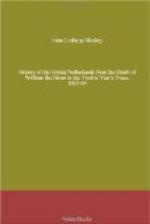Oh the 21st June Barneveld had a long private interview with the ambassador at Arundel palace, when he exerted all his eloquence to prove the absolute necessity of an offensive and defensive alliance between France and the United Provinces if the independence of the republic were ever to be achieved. Unless a French army took the field at once, Ostend would certainly fall, he urged, and resistance to the Spaniards would soon afterwards cease.
It is not probable that the Advocate felt in his heart so much despair as his words indicated, but he was most anxious that Henry should openly declare himself the protector of the young commonwealth, and not indisposed perhaps to exaggerate the dangers, grave as they were without doubt, by which its existence was menaced.
The ambassador however begged the Hollander to renounce any such hopes, assuring him that the king had no intention of publicly and singly taking upon his shoulders the whole burden of war with Spain, the fruits of which would not be his to gather. Certainly before there had been time thoroughly to study the character and inclinations of the British monarch it would be impossible for De Rosny to hold out any encouragement in this regard. He then asked Barneveld what he had been able to discover during his residence in London as to the personal sentiments of James.
The Advocate replied that at first the king, yielding to his own natural tendencies, and to the advice of his counsellors, had refused the Dutch deputies every hope, but that subsequently reflecting, as it would seem, that peace would cost England very dear if English inaction should cause the Hollanders to fall again under the dominion of the Catholic king, or to find their only deliverance in the protection of France, and beginning to feel more acutely how much England had herself to fear from a power like Spain, he had seemed to awake out of a profound sleep, and promised to take these important affairs into consideration.
Subsequently he had fallen into a dreary abyss of indecision, where he still remained. It was certain however that he would form no resolution without the concurrence of the King of France, whose ambassador he had been so impatiently expecting, and whose proposition to him of a double marriage between their respective children had given him much satisfaction.
De Rosny felt sure that the Dutch statesmen were far too adroit to put entire confidence in anything said by James, whether favourable or detrimental to their cause. He conjured Barneveld therefore, by the welfare of his country, to conceal nothing from him in regard to the most secret resolutions that might have been taken by the States in the event of their being abandoned by England, or in case of their being embarrassed by a sudden demand on the part of that power for the cautionary towns offered to Elizabeth.
Barneveld, thus pressed, and considering the ambassador as the confidential counsellor of a sovereign who was the republic’s only friend, no longer hesitated. Making a merit to himself of imparting an important secret, he said that the state-council of the commonwealth had resolved to elude at any cost the restoration of the cautionary towns.




